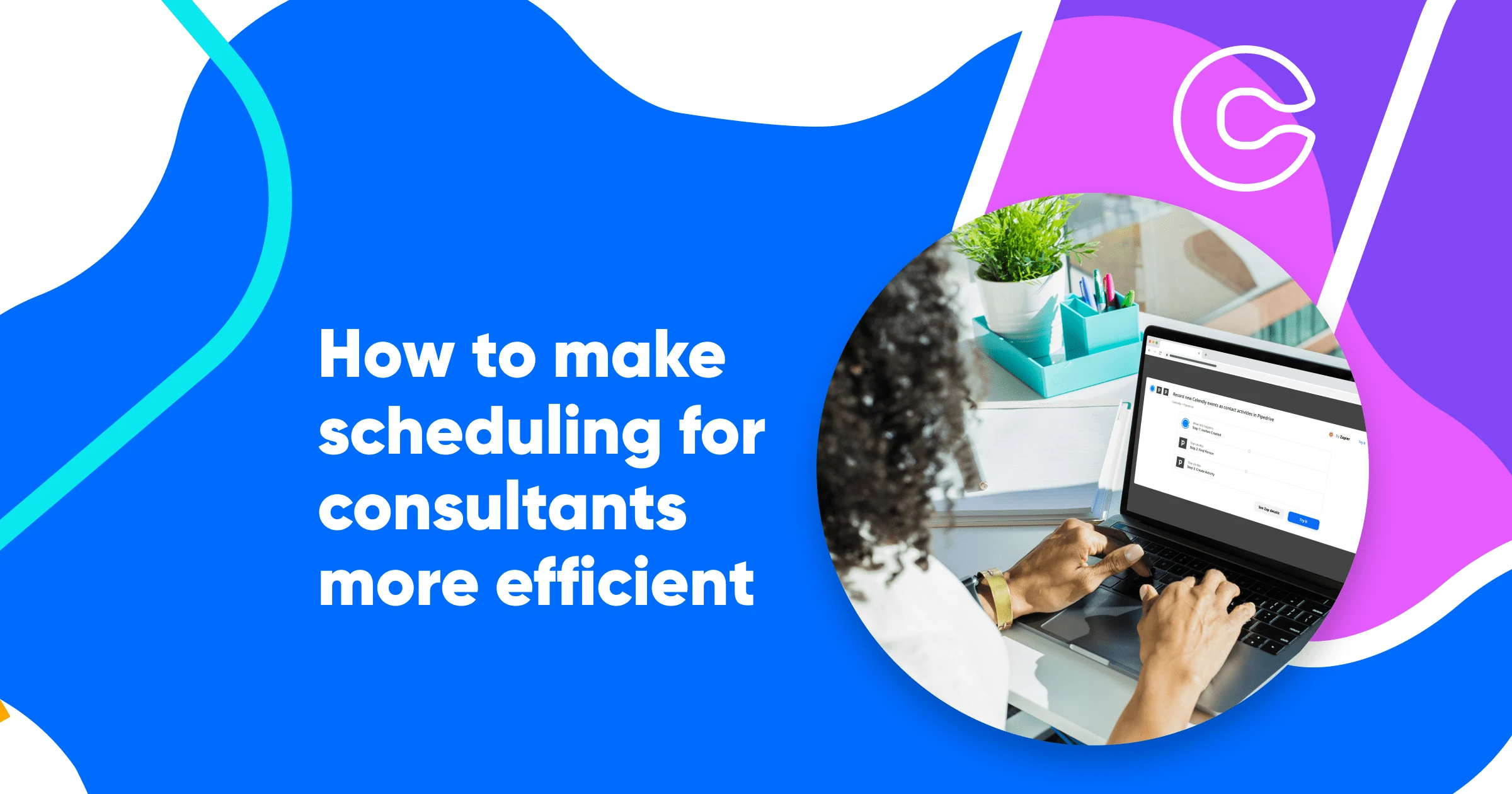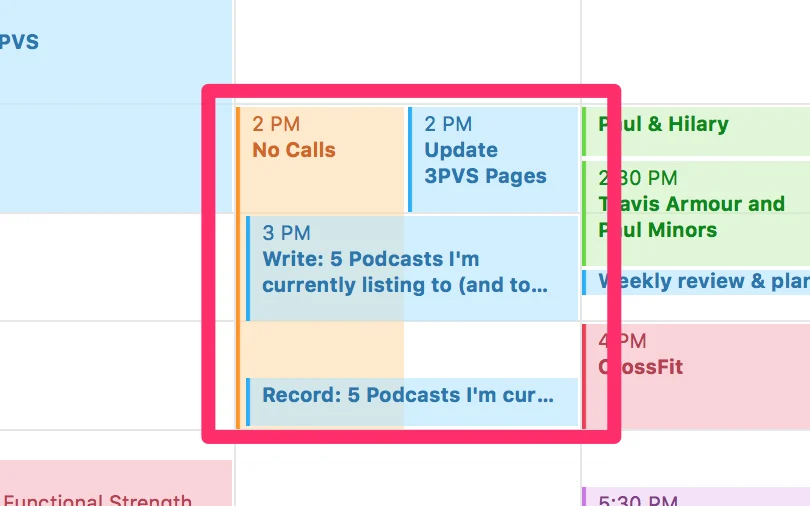Table of contents
“Time is money” may be a cliché, but today’s fast-paced world has made time our most valuable resource. We’re bombarded by professional and personal demands for it, with only so much to go around.
The meaning is literal for management consultants. Their time – the service they provide – powers their business. It’s more critical for independent consultants, who must also manage their business alone. Every minute spent on administrative tasks means fewer revenue opportunities.
It’s vital for consultants to transform time into revenue.
Paul Minors meets this challenge daily. The freelance “virtual productivity consultant” — certified for SaaS tools such as Asana, Pipedrive, and Zapier — examines personal productivity and workflow optimization issues. His insights help people in all types of roles better organize their time and accomplish more. He relies on Calendly to manage his own practice more effectively.
“As my consulting business has grown, Calendly has become an increasingly important tool,“ he explains. “Because my work involves spending chunks of time with clients on Zoom, I need an efficient system for allowing [them] to book time on my calendar while still keeping overall control of my time.”
A Calendly power user, it’s been part of Paul’s business “since day one” and his personal scheduling workflow for even longer. His recent video offers insights on how Calendly’s time-saving features can keep your revenues flowing.
Prioritizing revenue-generating availability
When taking meeting requests, it’s important to make time for ones contributing to your bottom line. Paul’s public Calendly page offers complimentary bookings to meet new clients and understand their needs. These are filled weeks in advance, but there are always prospects with urgent needs that want to meet sooner — and are willing to pay.
Calendly enables you to categorize meetings into different types. It offers the flexibility to classify event types by audience, purpose, time, or any other combination. Paul uses this functionality to create priority introductory sessions requiring a $50 fee (charged through a Stripe integration).
Paul then arranges his day to ensure availability for these revenue-generating bookings. “I take priority calls in the morning. I wanted to make sure that if I get fully booked during the day, I still have an available slot for those [paid bookings]. There’s no overlap with [the] other event types.”
Preserving work time
Prioritizing Calendly event types also ensures time for other revenue-generating activities. You risk being overbooked if you don’t save calendar space for actual work. “If you just set your generic availability from 9 to 5, it’s very easy to get booked up back-to-back,” Paul observes. That can translate into missed deadlines, unhappy clients, and fewer future opportunities.
Calendly cross-references events across multiple calendars (project plans, personal time, etc.) so there is no risk of double-booking. This not only gives you more booking flexibility; it also helps you dedicate bandwidth to working on tasks that drive revenues – especially ad-hoc, quick-turn projects.
Paul suggests creating a “Busy” calendar in Availability Schedules to override your availability settings when you need to focus time elsewhere. “I use a Busy calendar to block out portions of the day (or even the entire day) if I need to spend some time on other projects and I don’t want to give clients the option to book me during this time.”
Another way he stays focused on revenue is by logging his Calendly bookings and setting a daily limit of available hours using the Maximum Allowed Events Per Day feature. If Paul reaches that limit, an automated workflow program books his remaining open Calendly slots so no further hours can be booked. He can then spend the rest of the day serving clients.
Automating the pipeline
A successful business must continually forecast revenue and plan accordingly. Managing your pipeline is a key part of the revenue integrity process and one where Calendly’s ability to integrate with other applications enables more efficiencies.
Pipedrive is a popular CRM tool for small and medium size businesses (SMBs) to track deals. However, like any CRM, each new prospect requires creating contact information, deal details and connections to other projects — not to mention verifying the information. This takes time away from activities that could be creating revenue.
Paul uses Zapier (a process automation tool that connects applications) to integrate Calendly with Pipedrive and automate these administrative tasks. “When I take an introductory booking, a contact and a deal will be set up in Pipedrive. Calendly is the trigger…it only runs if it’s a consulting booking. It will format the event type and name…it will find or create a person, update that person; find or create deal, update the deal; create an activity for [me] to call them, creates an activity for my assistant to confirm the booking…and check 24 hours beforehand to see if they’re still available.” You can contact Paul if you’d like help connecting Calendly to your CRM.
Paul programs his workflow to automatically estimate revenues for priority case deals based on the services he’ll provide. This information comes from the answers to questions for prospects he set up in Calendly’s booking request form.
While Pipedrive has its own scheduler, Paul finds Calendly “…more powerful as it can check multiple calendars for event conflicts, take payments, set up Zoom meetings, etc. — and Calendly is just a lot better. I also use it to schedule calls with existing clients, not just leads. Calendly also [has] some good embed options for adding [it] to your website, which the Pipedrive scheduler doesn't have.”
Enabling invoices and payments
Perhaps the most important part of a business is revenue integrity — making sure opportunities create income (better known as getting paid). Without efficient payment collection, you can spend valuable time invoicing and creating links to payment sites instead of maintaining revenue streams.
Calendly offers full integration with online payment services including PayPal and Stripe (Paul’s preferred options). He includes these payment links in his priority booking invitations — effectively making them double as invoices. Using this functionality, you can effectively turn Calendly into a one-stop shop for time and revenue management.
For people like Paul Minors, time isn’t just money — it’s the potential to be money. Calendly transforms more of it for you.
Get started with Calendly
Webinar: Getting started with Calendly
Related Articles
Don't leave your prospects, customers, and candidates waiting
Calendly eliminates the scheduling back and forth and helps you hit goals faster. Get started in seconds.
Calendly eliminates the scheduling back and forth and helps you hit goals faster. Get started in seconds.


